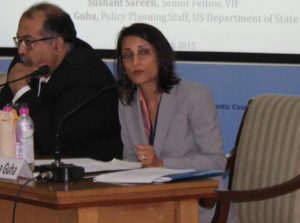 Tonight, we had the pleasure of hearing from Sumona Guha, Senior Director at the US India Business Council. She gave us a very interesting summary of the developments in India over the past couple of years. Her talk focused mainly on the benefits that have resulted from the election of Narendra Modi as Prime Minister in 2014. Prime Minister Modi has been successful in liberalizing the Indian economy and raising the country’s position on the World Bank’s Ease of Doing Business Report from 132nd out of 190 countries in 2013 to 100th in 2018.
Tonight, we had the pleasure of hearing from Sumona Guha, Senior Director at the US India Business Council. She gave us a very interesting summary of the developments in India over the past couple of years. Her talk focused mainly on the benefits that have resulted from the election of Narendra Modi as Prime Minister in 2014. Prime Minister Modi has been successful in liberalizing the Indian economy and raising the country’s position on the World Bank’s Ease of Doing Business Report from 132nd out of 190 countries in 2013 to 100th in 2018.
One of the major reforms that has contributed to this increase is the Goods and Services Tax. This tax is intended to streamline taxing policies and procedures among India’s various departments in order to increase simplicity and remove double taxation. Unfortunately, due to the vague description of the tax brackets, foreign products often end up in the highest tax bracket of 28%. Moreover, due to this fluid regulatory environment, several companies have been hit with some retroactive tax assessments. While Prime Minister Modi is attempting to equalize the taxation process, departments still have a lot of power and have a protectionist culture that will have to be changed slowly over time. Along the same lines, foreign companies will also have to work to overturn the nationalistic feeling that many residents exhibit.
Foreign companies have started to do this by creating community involvement initiatives. By showing that they care for the local community and not simply for profits, foreign companies are trying to show the Indian consumer that they are not simply trying to exploit them. Prime Minister Modi has created a program that encourages all companies to give back to the community; he has created a requirement where all companies need to donate 2% of their revenues to a CSR program not directly related to the operation of the business. If the company does not donate those 2%, they will be placed into the Prime Mister’s Relief Fund, where the Prime Minister can allocate the money at his discretion.
Prime Minister Modi has created the “Make in India” program that is further aimed at encouraging businesses to help the Indian community. The “Make in India” program gives companies who manufacture 30% of their goods in India certain benefits, such as decreased taxation. With this policy, Modi seems to be trying to get India’s economy out of the agrarian sector–which currently makes up 78% of the economic output–to an industrialized economy as manufacturing has a higher return than agriculture. India is following in China’s footstep which rather successfully grew its economy by turning into an industrialized economy and became a world power due to its growing economy.
I found this talk to be very interesting because India is making very determined steps to raising itself out of poverty. It seems to be liberalizing its economy in order to create more jobs and to leverage the new companies in order to increase investment in the Indian people. Overall, this talk gave a very good description of the new political and economic trends of the country and was an asset to our upcoming Under Armour expansion into India presentation.